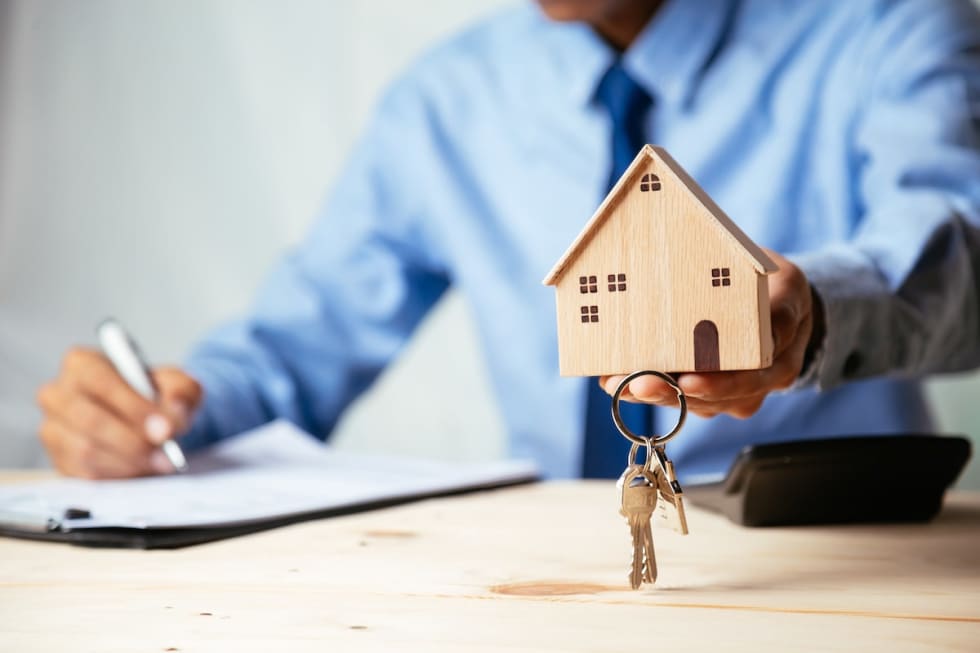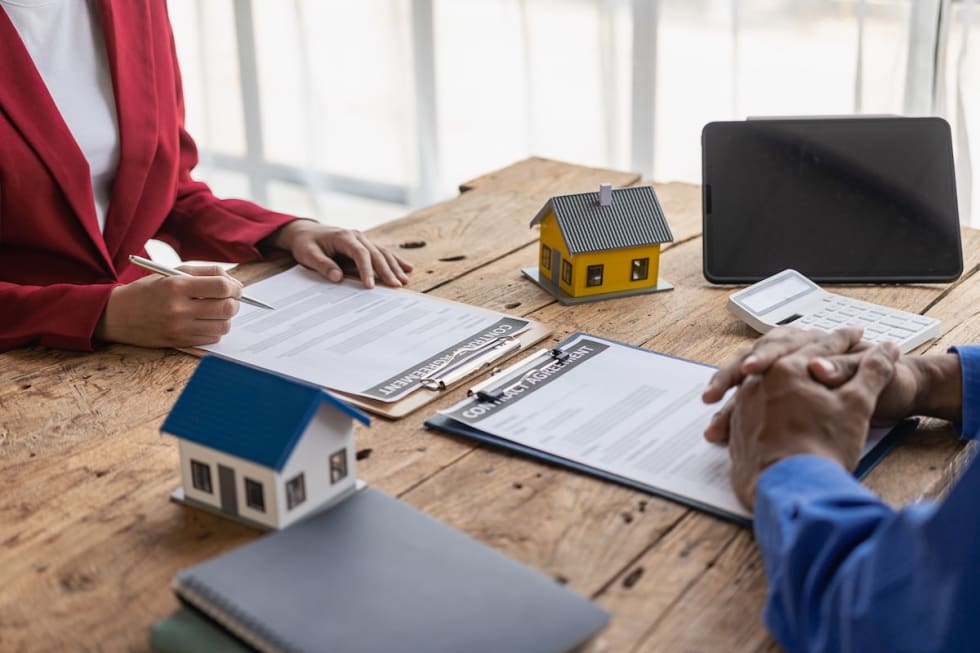Leasing a House for the First Time [2024]

So, you're thinking about ditching the apartment and venturing into the world of spacious houses? Well, before you get swept away by visions of picket fences and cozy fireplaces, take a deep breath and dive into the practicalities of leasing your first house.
This guide is your compass, navigating you through the search process, lease agreements, and all the intricacies of living in your own little castle. We'll explore finding the perfect house, understanding leases, weighing the pros and cons, and even touch on options like lease-to-own. So, grab your keys, and let's unlock the secrets of leasing a house for the first time!
House Leasing
What Is House Leasing?
Leasing a house (also known as renting a house) is a formal agreement where you pay the owner (lessor) a set monthly rent to live in their house for a specific period, usually one year or more. Think of it as essentially the same as renting an apartment but with more space, privacy, and potential perks like a yard or garage, compared to an apartment.

What Is the Difference Between Leasing a House and Renting an Apartment?
In general, there is little distinction between a lease agreement you might sign for a house versus an apartment. In both cases, you’re likely to sign for an extended period of time, with 12-months being the most common lease length. Rental homes are subject to the same laws and regulations as other rented living spaces. However, there are some reasons why renters may prefer houses over apartments (or vice versa):
- Landlord: You are more likely to rent from a private individual if you lease a house, though there are property management companies that handle houses as well.
- Security Deposit: Security deposits for house rentals tend to be larger than apartments.
- Living Space: Houses offer more square footage and privacy than apartments, with dedicated bedrooms, bathrooms, and often, outdoor areas. Apartments tend to be more compact and share walls with neighbors.
- Amenities: Houses may have features like private yards, garages, and in-unit laundry, while apartments often rely on shared amenities like gyms, pools, and laundry rooms.
- Maintenance: In a house, you may be responsible for yard maintenance, while apartments typically handle those through building management. Other kinds of maintenance should still be handled by your landlord.
- Cost: Rent for houses usually runs higher than apartments in the same area due to the increased space and amenities.
- Flexibility: Lease terms for houses may be more flexible than apartment leases, with options to negotiate duration and potentially even purchase the property in the future.
Who Should Lease a House?
Leasing a house can be a fantastic option for people in various life stages and with diverse needs, but two groups that might particularly benefit from the spaciousness, privacy, and potential perks of living in a standalone dwelling are families and pet owners.
With dedicated bedrooms, bathrooms, and often a backyard, houses offer room for children and pets to grow and play. Parents can enjoy some quiet time in their own space, and everyone has the luxury of spreading out without feeling cramped. For families seeking a comfortable and convenient environment to raise their kids, a house lease can be a wise choice.

How Much Does It Cost to Lease a House?
Monthly rent for a house can vary widely, though is generally more expensive than renting an apartment. The best way to figure out how much you might spend on rent for a house is to look at monthly rental data for your area. You can use our extensive database of rent estimates to find a city near you. You'll be able to see average rent prices for units with one, two, and all numbers of bedrooms. From there, you will have a better sense of how much renting a house might be.
Expect to pay anywhere from $1,000 to $3,000 for a 2-bedroom house depending on where you live and other features in the home. For more about budgeting for house rental, check out this great video from Practical Personal Finance:
Finding Houses for Lease Near You
The internet is your portal to a vast kingdom of rental houses. But with so many options, where do you start? Popular apartment listing sites like Apartment List can be invaluable tools for house hunting too! Just a few tweaks in your search filters can open up a treasure trove of single-family listings:
- Property Type: Most platforms allow you to specify "House" or "Single-Family Home" under the property type filter. This eliminates apartments and duplexes from your search results.
- Amenities: Get creative! Look for filters for keywords like "yard," "garage," or "backyard" to narrow down your options to houses with desirable outdoor features. Don't forget terms like "detached" or "standalone" to ensure you're only seeing houses, not attached units.
- Advanced Filters: Many platforms offer advanced filters like number of bedrooms and bathrooms, square footage range, and even pet-friendliness.
Apartment List works by asking you for everything you could ever want in an apartment and then offering you different ways to “flex” your choices. When you take our easy quiz to get started, we’ll ask you general questions about your ideal rental, and then you’ll be able to narrow your search to houses. We have thousands of house listings on our site!
How to Lease a House
Congratulations! You've found your dream house! Now comes the thrilling moment of securing that lease and making it your own. But before you sign on the dotted line, take a deep breath and delve into these crucial steps:
- Understand the Lease Agreement: This legal document outlines the terms of your residency, including rent, duration, tenant responsibilities, and maintenance procedures. Read it carefully, ask questions, and don't hesitate to negotiate any unclear or unfair clauses. Remember, a lease is a two-way street!
- Prepare Your Paperwork: Gather your proof of income, references, and identification documents, as most landlords will require them for background checks and creditworthiness assessment. Having everything organized will streamline the process.
- Secure Your Deposit and Rent: Depending on the agreement, you may need to pay a security deposit and possibly the first month's rent upfront. Make sure you understand the payment methods and deadlines to avoid any hiccups.
- Conduct a Move-In Inspection: Walk through the house with your landlord before officially moving in and document any existing damage or concerns. Take photos and videos for your records, as this serves as a baseline for future comparisons.
- Get Informed About Tenant Rights and Responsibilities: Familiarize yourself with the local laws and regulations governing tenant rights and responsibilities. Knowing your rights empowers you to navigate any future issues confidently.

Pros and Cons of Leasing a House
Before you sign on the dotted line, take a moment to ponder the two sides of the coin. Leasing a house, like any lifestyle choice, comes with its unique set of advantages and disadvantages. Let's delve into both, shall we?
Pros of Leasing a House
- Space to Spread Out: Houses offer expansive living areas, dedicated bedrooms and bathrooms, and potentially even a private yard or patio. It's perfect for families, couples who crave quiet corners, or anyone who thrives on a sense of spaciousness.
- Privacy and Control: Walls no longer share your secrets! In a house, you're your own kingdom. Play your music loud, decorate to your heart's content, and enjoy the freedom to live life on your own terms. Plus, you typically have more control over maintenance and upkeep compared to apartments.
- Potential Perks: From cozy fireplaces and garages to lush gardens and swimming pools, houses can offer amenities that simply aren't available in most apartments. These perks can significantly enhance your quality of life and create a truly personalized living experience.
- Flexibility and Options: Lease terms for houses can be more flexible than apartment leases. Some houses might offer the option to purchase later, giving you a potential stepping stone towards homeownership. Plus, if your needs change, you can often choose to renew or relocate after the lease period ends.
Cons of Leasing a House
- Higher Costs: Be prepared to face pricier rent compared to similar-sized apartments in the same area. Houses often come with additional expenses like yard maintenance, utilities, and potentially repairs. Factor in these costs to ensure your budget can handle the extra burden.
- Maintenance Responsibilities: While you have more control over upkeep, you're also responsible for it. Leaky faucets, broken appliances, and yard work become your domain. If you're not handy or prefer a hands-off approach, a house might not be the best fit.
- Less Community Vibe: Unlike apartment buildings with shared spaces and close neighbors, houses typically offer a more isolated living experience. If you thrive on community interactions and spontaneous social gatherings, leasing a house might feel less vibrant.
- Uncertainty and Instability: Leases are temporary, and while some offer renewal options, you don't have the long-term security of owning a home. This can be a drawback for people who crave stability and want to put down roots in one place.
Can You Lease-to-Own a House?
Lease-to-own agreements, also known as rent-to-own or option-to-purchase contracts, combine renting with the right to purchase the house at the end of the lease term. It can be a tempting path for those who lack the necessary down payment for a mortgage or have credit challenges that hinder traditional home loans.
The Two Paths of Lease-to-Own
There are two main types of lease-to-own agreements:
- Lease-Option Contract: This gives you the option to buy the house at the end of the lease, but it's not an obligation. You pay a premium along with your rent that goes towards the potential purchase price. If you decide not to buy, you lose the premium.
- Lease-Purchase Contract: This essentially binds you to buying the house at the end of the lease. You typically lock in a purchase price upfront and a portion of your rent goes towards building equity. However, backing out at the end can lead to hefty penalties.
Weighing the Pros and Cons
For some, leasing to own offers an opportunity to gradually build equity and eventually own a home they couldn't otherwise afford. You may gain access to better houses than you could currently rent due to the potential purchase element. Finally, consistent rent payments and building equity can positively impact your credit score, paving the way for a future mortgage.
However, you should be aware that rent tends to be higher than standard rates due to the option-to-buy element and potential fees. You may also be responsible for repairs and maintenance, unlike standard rentals. Finally, if you default or can't secure financing, you lose your invested money and the house.
Ready to Find a House to Lease?
Take Apartment List's quick quiz and let us help you match with your dream house! Answer a few questions about your needs and style, and we'll show you stunning houses for rent near you. No more endless scrolling, just personalized results that fit your ideal location and lifestyle.
Share this Article

